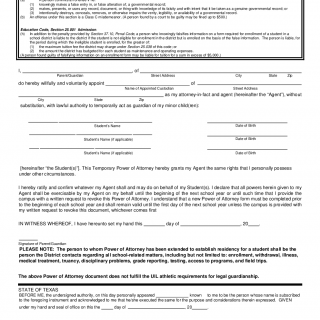Temporary power of attorney
A temporary power of attorney is a legal document that grants someone else the authority to act as an agent or attorney-in-fact on behalf of the person who is granting the power of attorney. This type of document is typically used for a specific period of time and for a specific purpose.
Cases where a temporary power of attorney may be made include when someone is going on an extended trip or is unable to act on their own behalf temporarily due to illness or incapacitation. The person who grants the power of attorney is called the principal, while the person who is granted the power is called the agent or attorney-in-fact.
The document consists of several parts, including the identity of the principal and the agent, the specific powers being granted, and the duration of the power of attorney. It is typically drawn up by an attorney or legal professional and must be signed and notarized for it to be legally binding.
The advantages of a temporary power of attorney include the ability to ensure that someone's affairs are taken care of during a temporary absence or incapacitation. This can help to avoid potential legal issues and conflicts among family members or others who may have an interest in the principal's affairs.
A negative consequence of a temporary power of attorney can occur if the agent abuses their power or takes actions that are not in the best interests of the principal. This can result in legal or financial consequences for the principal, and can even result in criminal charges for the agent.
The legal force of a temporary power of attorney depends on the specific language used in the document and whether it meets the legal requirements of the jurisdiction in which it is used. In general, however, a properly executed power of attorney can give the agent broad legal authority to act on behalf of the principal.

